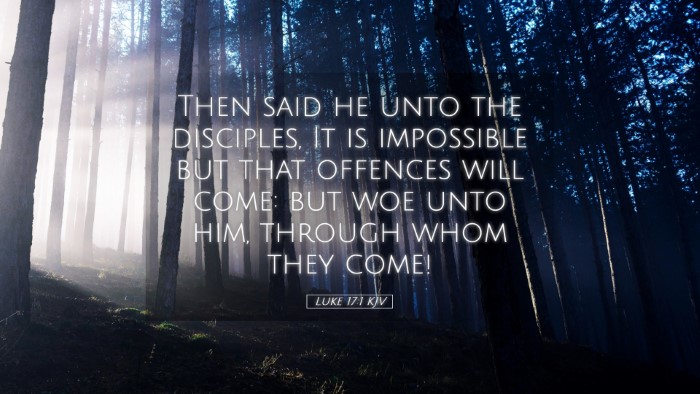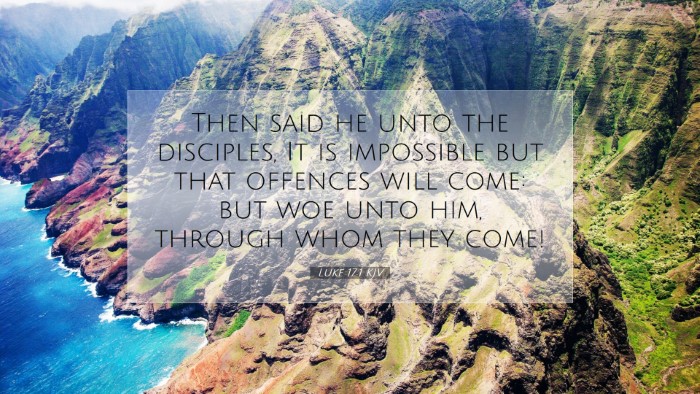Commentary on Luke 17:1
Verse: "Then said he unto the disciples, It is impossible but that offences will come: but woe unto him, through whom they come!"
Introduction
In this passage from the Gospel of Luke, we find Jesus instructing His disciples about the inevitability of offenses and the serious consequences for those who are the cause of such offenses. This verse serves as a profound teaching moment, highlighting themes of accountability, moral integrity, and the weight of leadership. Several public domain commentaries lend rich insights into these ideas, providing a deeper understanding for pastors, students, theologians, and scholars.
Analysis of the Verse
I. The Certainty of Offenses
“It is impossible but that offences will come”
- Matthew Henry: Henry emphasizes the inevitability of offenses within human relationships. He points out that living in a fallen world, believers must expect confrontation, temptation, and strife. This reality calls for vigilance and strong moral character among believers.
- Albert Barnes: Barnes notes that while offenses are bound to occur, the focus should be on one's personal response to these situations rather than merely anticipating their arrival. He encourages followers of Christ to live in a way that reduces the likelihood of causing offense to others.
- Adam Clarke: Clarke elaborates on the Greek term for "offense," which means a stumbling block. He indicates that offenses are not only intrinsic to human interaction but often arise from our actions that lead others into sin or stumbling. This requires a deeper reflection on personal conduct and its impacts.
II. The Woe to the Offender
“but woe unto him, through whom they come”
- Matthew Henry: Henry strongly emphasizes the gravity of being the cause of offense. He interprets "woe" as a divine lament over the judgment that awaits those who lead others astray. The responsibility of leadership in a spiritual context is particularly significant, as it can have far-reaching effects on the faith journey of others.
- Albert Barnes: Barnes explores this notion of woe, suggesting that it refers not just to the physical or emotional consequences but also its spiritual implications. He argues that causing another to stumble is a serious moral failing, which may lead to divine retribution.
- Adam Clarke: Clarke discusses the theological ramifications of leading others into sin. He articulates that Jesus’ words serve as a warning against the casualness with which we may engage in behavior that negatively influences others. The idea of personal morality is therefore linked to communal responsibility.
Theological Implications
The theological implications of this verse are profound. It serves as a reminder of the fallen state of humanity and the omnipresent potential for sin within our interactions. However, it also invites reflection on God's grace and the possibility of reconciliation. The balance between recognizing our shortcomings while striving for holiness is a central theme in Christian theology.
Moral Responsibility
In light of this scripture, believers are called to a higher standard of conduct. Pastors and Christian leaders should consider how their actions influence those around them. The weight of responsibility in teaching and leading cannot be understated; it requires humility, prayer, and a steadfast commitment to the teachings of Christ.
Conclusion
Luke 17:1 serves as a critical reminder of the challenges believers face and the importance of maintaining integrity in our interactions. The commentaries by Matthew Henry, Albert Barnes, and Adam Clarke collectively challenge pastors, students, and theologians to engage deeply with the implications of causing offense. The call to live in a way that builds up the faith community and avoids leading others astray is an enduring principle that should guide every follower of Christ.


